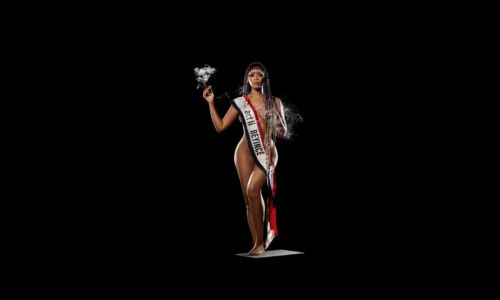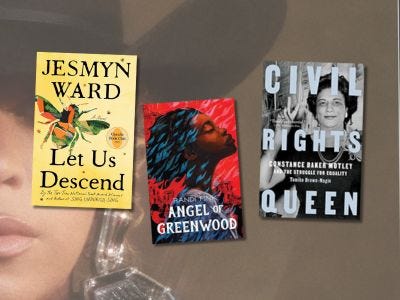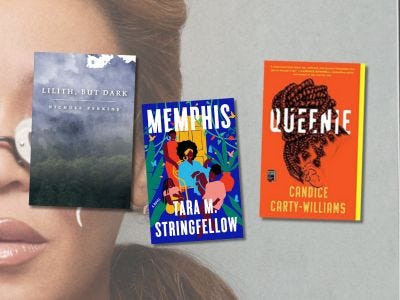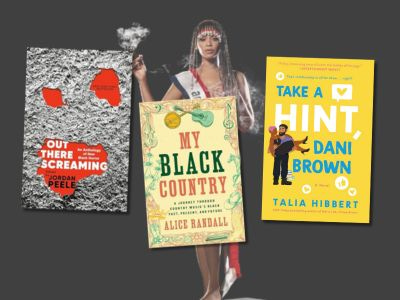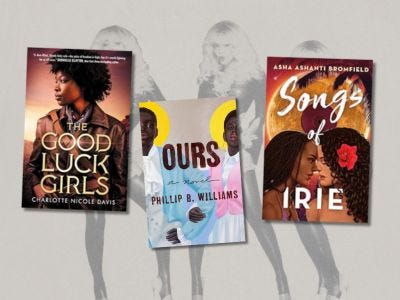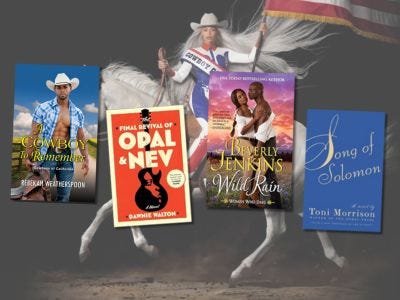A Bookish Guide to Beyoncé’s ★ Cowboy ★ Carter
Erica Ezeifedi, Associate Editor, is a transplant from Nashville, TN that has settled in the North East. In addition to being a writer, she has worked as a victim advocate and in public libraries, where she has focused on creating safe spaces for queer teens, mentorship, and providing test prep instruction free to students. Outside of work, much of her free time is spent looking for her next great read and planning her next snack.
Find her on Twitter at @Erica_Eze_.
View All posts by Erica Ezeifedi
If you’ve been anywhere on the internet the last few weeks, you’ve most likely seen some mention of Beyoncé’s latest…I would say album, but the entire rollout has been a bit of an event. And, as the self-appointed, unofficial Beyoncéologist of Book Riot, I thought it fitting that I look at it all through a bookish lens.
It all seems to have started with the Grammys a month ago when she wore a head-to-toe cowgirl get-up that was reminiscent of a certain business owner from the show Fairly Odd Parents. It added fuel to the idea that she was going to make her act II—the next piece in her three-part music series—country-based, thereby reclaiming the genre for Black Americans.
And she did. Kind of.
In Reading Color Newsletter
A weekly newsletter focusing on literature by and about people of color!
Thank you for signing up! Keep an eye on your inbox.
She released a couple of songs that were obviously rooted in country music, and they did well, but they had another effect: they brought out the racists.
And they were Big Mad. All of their complaints were obviously thinly veiled attempts at gatekeeping country music, despite the genre having largely come from Black Americans and the West African instrumental designs and rhythmic leanings they brought with them across the Middle Passage.
But it seems like Beyoncé was expecting all this. In fact, part of the inspiration for the latest album was her experience going to the CMA Awards, where she performed with the Dixie Chicks, and where, she said, she felt very unwelcome.
Then she did something interesting. She waited, poured over American musical history for the next eight years, and created what I—as someone who’s been listening to her for the past 20 years—think is the best album she’s ever made. I would even go so far as to say it’s the best album made by a major pop star within the last few years.
At times, it feels both like a descent into the dirty past of the U.S., and other times like an ascension—up into a look at what country music (and all American pop music) could have been if racial barriers didn’t bar certain people from certain genres.
In it, Beyoncé dips in and out of gospel, opera, soul, ‘70s funk and rock, and into ‘60s pop leanings, and of course, country. It’s basically like an odyssey through a sort of musical memoir of hers—or, an odyssey through American music. It has this inherent cinematic quality to it that gets made more complex with certain moments of eeriness and well-placed Black woman realness. And then there are the seamless transitions from song to song that she perfected in her last album, Renaissance.
Over the album’s 27 tracks, she’s moving mountains, losing her religion, and messing somebody up while in her “custom coutures.” She dedicates herself to her lover and her children, and plays homage to greats like Linda Martell, whose story has some parallels to Beyoncé’s experience at the CMAs, albeit with a much sadder outcome.
She also speaks of the struggle of shifting expectations that always seem to result in Black women inevitably being othered, and how the foundation of this country was built on Black and Indigenous bodies, both literally and figuratively. It’s additions like these that make Cowboy Carter as much an autobiography of hers as it is a cultural biography of America.
She’s given us a lot to chew on in this album, and so I’ve got some books that I think will accompany the listening experience beautifully.
There are a few books I think complement many of the overarching themes of the album, like Black American—or, just American, really—musical and general history, revenge, and the odyssey of life. There are also a few books that I think are specifically suited to individual songs.
For starters, We Refuse: A Forceful History of Black Resistance by Kellie Carter Jackson and The American Daughters by Maurice Carlos Ruffin both tell the story—nonfictional and fictional, respectively—of how Black people have historically resisted oppression in this country. And, in the name of love, the poetry collection Postcolonial Love Poem by Natalie Díaz reclaims Indigenous and Black bodies from the sacrifice America made of them, while Lone Women by Victor LaValle tells a Black woman’s journey West in 1915. It encapsulates the overall haunting qualities I picked up on throughout the album. Finally, Coming Through Slaughter by Michael Ondaatje touches on a moment in American musical history by telling a fictionalized story of the father of Jazz, Buddy Bolden, whose life ultimately had a sad end.
And now for the individual tracks:
AMERIICAN REQUIEM
As with Let Us Descend by Jesmyn Ward, we descend into the muck of American history with the album’s first song, AMERIICAN REQUIEM. There is some hope mixed in, though.
BLACKBIIRD
Paul McCartney has said he wrote this song in honor of the Little Rock Nine and the general struggle of Black American girls during the Civil Rights movement. Knowing this, and listening to the song, brings to mind Angel of Greenwood by Randi Pink and Civil Rights Queen by Tomiko Brown-Nagin.
16 CARRIAGES
The poetry collection Lilith, But Dark by Nichole Perkins takes an intimate look at the life of a Black woman from Nashville.
PROTECTOR
Memphis by Tara M. Stringfellow looks at matrilineal tradition, trauma, and art.
MY ROSE
You may notice that I’m mostly sticking to American-based stories for this list because Cowboy Carter is so inherently American, but I had to bust out Queenie by Candice Carty-Williams for a song that reminds the girlies to engage in a little self-love, which Queenie desperately needs.
SMOKE HOUR ★ WILLIE NELSON
While this track is not even a minute long, it and a couple of the other interludes throughout the album contributed to that eerie feeling I mentioned before. It’s something to do with the radio tuning in and out of stations combined with the old-timey music, I think. It reminded me of aspects of Jordan Peele’s Nope, which is why I’m matching this track with Out There Screaming, edited by Jordan Peele.
TEXAS HOLD ‘EM
The Award for Perfect Timing goes to My Black Country: A Journey Through Country Music’s Black Past, Present, and Future by Alice Randall, because this documented search for the Black first family of country music is out April 9th.
BODYGUARD
Take a Hint, Dani Brown by Talia Hibbert fits this, mostly because of an early scene in the book, but also because of general Spiciness (yes, with a capital “S”).
DAUGHTER and SPAGHETTII
Good Luck Girls by Charlotte Nicole Davis is a dystopian western that fits the general “eff around and find out” vibe of both DAUGHTER and SPAGHETTII so well.
ALLIIGATOR TEARS
Ours by Phillip B. Williams sees the conjuror Saint basically moving mountains—as Bey does in this song—to free her people, but at what cost is the question.
II MOST WANTED
Here, Bey and Miley sing a duet of utter devotion in the midst of adversity, and, sure, it could be said that they were singing to their respective male partners, but I chose to go the sapphic route with Songs of Irie by Asha Ashanti Bromfield.
LEVII’S JEANS
A Cowboy to Remember by Rebekah Weatherspoon has a semi-shirtless Black cowboy on its cover. Enough said.
YA YA
This song is one of the standouts on the album, and has a lot of Tina Turner influence in it, hence my recommendation of The Final Revival of Opal & Nev by Dawnie Walton.
TYRANT and SWEET ★ HONEY ★ BUCKIIN
You can’t go wrong with a historical romance by Black Romance Queen Beverly Jenkins, and Wild Rain centers a bold Black woman rancher named Spring, who I imagine can do…some of the activities Bey describes in the songs. 👀
AMEN
Cowboy Carter and Song of Solomon by Toni Morrison both begin and end the same: with what could be interpreted as an elegiac refrain, or a hopeful beginning.
There are still so many other books that could fit these and the other songs on the album, but there is only so much time in the day. What I do know is that Beyoncé has crafted such a beautiful piece of art that I will be happily returning to in the months to come.

